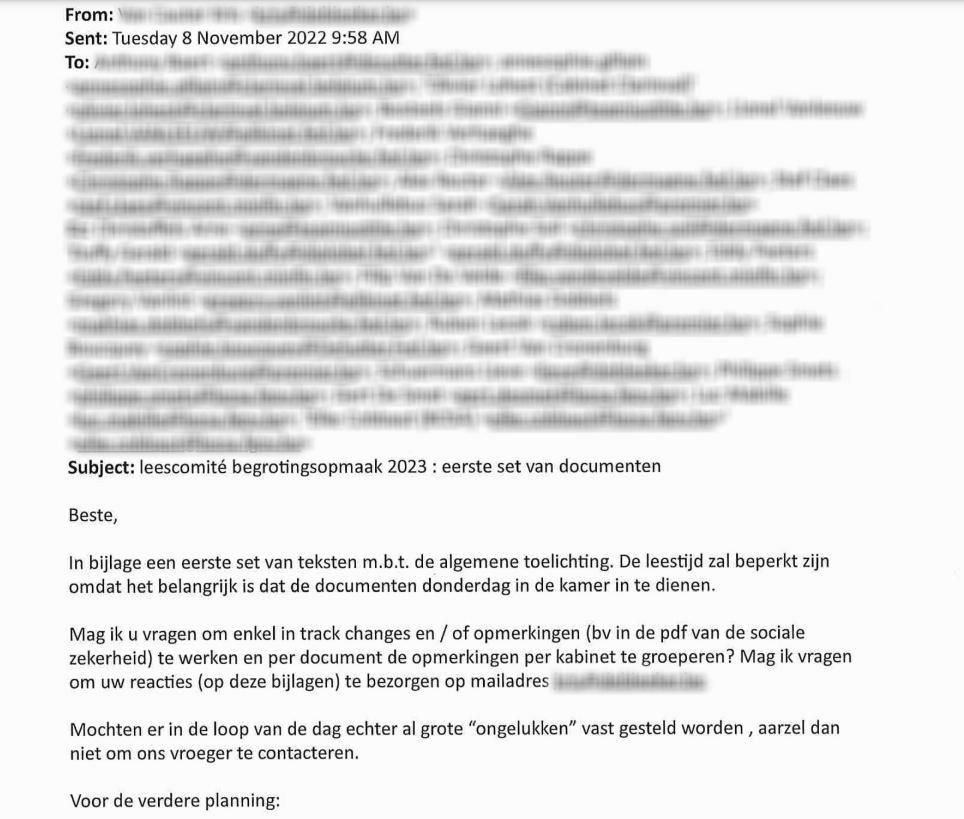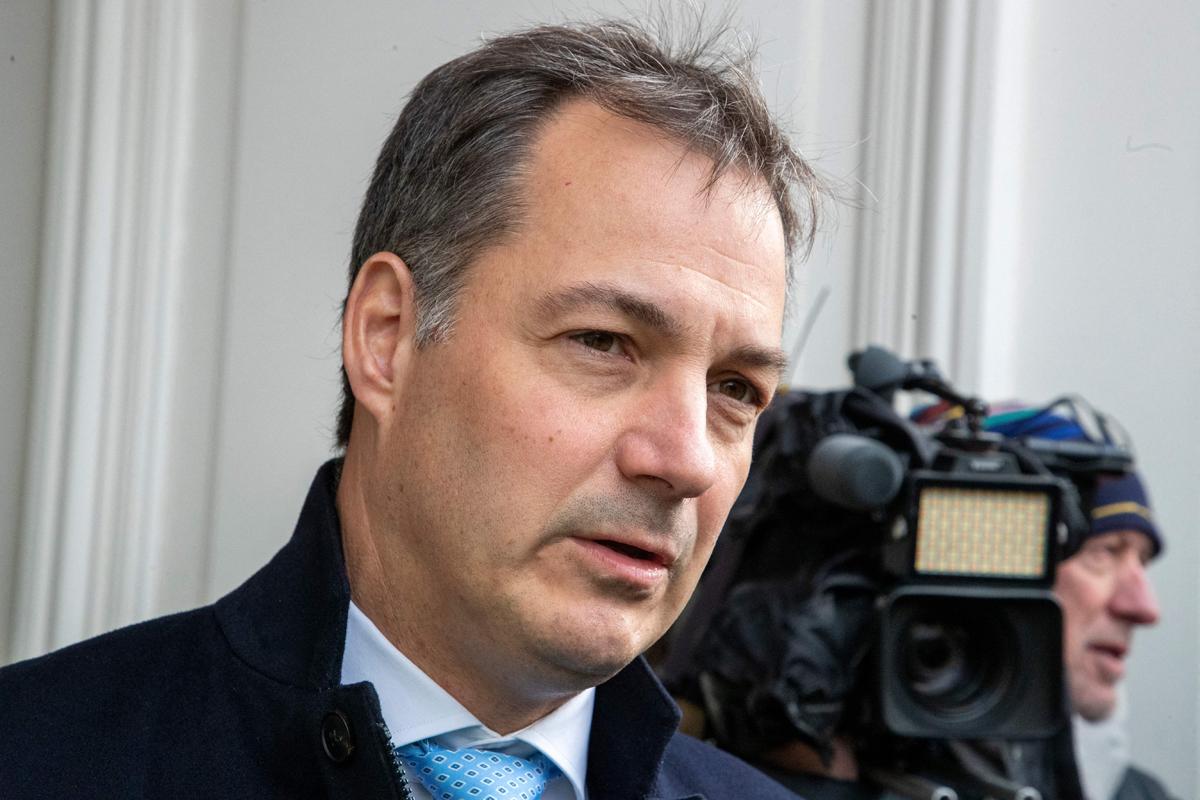Prime Minister Alexander De Croo’s cabinet also did not comment on the increased budget deficit in the “standard channels”. This can be seen from the communication referred to by the premier and which Knack is now publishing in full.
The cabinet of Prime Minister Alexander De Croo (Open VLD) has not commented in any way on the tables and figures contained in the explanation of the budget, distributed by Undersecretary of State for the Budget Eva De Bleeker (Open VLD) on 10 November. This can be seen from the email containing all the comments and corrections that the De Croo cabinet sent to the De Bleeker cabinet on Wednesday 9 November. Skills came into possession of that email, after already releasing the full WhatsApp messages earlier this week.
Those WhatsApp messages showed that the De Croo cabinet had made no further comments on the wider budget deficit shortly before sending the final version of the budget to the printer. But De Croo reacted to the publication in front of the cameras Skills: ‘A budget is not approved via SMS. We have clarified very clearly through other channels – what is called the reading committee – that what the undersecretary writes there is not correct.’ In this context, the prime minister sometimes refers to “standard channels”. The ‘reading committee’ referred to by the prime minister is made up of all the heads of cabinet of the deputy prime ministers and the prime minister and their budget advisers. They can make comments, ask questions, make corrections to the text.
Skills publish here the e-mail of the representatives of the De Croo cabinet in the reading committee – the ‘standard channels’ referred to by the premier. This shows that the De Croo cabinet made no comment on the increase in the budget deficit, much less that it was asked to change it.
Read the email from the De Croo cabinet representatives on the reading committee here:
To recap:
The explanatory notes to the 2023 budget were ready on Tuesday 8 November. This included the cost price of the VAT reduction on gas and electricity, as decided by the Cabinet on 28 October. FPS Finance calculated the cost at $1.325 billion in 2023. Proceeds from the planned offset via an excise reform were not included because the amount is uncertain. According to experts, the collection will also be much lower than the 1.325 billion that the reduction in VAT costs. CD&V party leader Servais Verherstraeten, for example, also said in the finance committee: “The VAT reduction on energy will not be budget-neutral next year” and even doubted that that will ever happen. Contrary to what the premier has sometimes stated.
Because the reduction in VAT costs the budget deficit that the Prime Minister had envisaged in his State of the Union on 11 October, or from 5.8 per cent of GDP (gross domestic product) to 6.1 per cent . This gives us the largest deficit of all EU countries.
Only on Monday 14 November, after the opposition has noticed the increase in the budget deficit, will discussions take place whether or not the Prime Minister’s Office has agreed to such an increase in the deficit. This will ultimately lead to De Bleeker’s sacking on 18 November.
Track changes
On November 8, two emails will be sent to all members of the reading committee, on the timing and procedure to follow. “Reading time will be limited as it is important that papers are presented in the room on Thursday (sic),” it read. ‘Can I ask you to work only on track changes and/or comments and to group comments by file by document?’ It is the normal procedure: the texts are circulated to all the experts, and whoever has comments can pass them on. If there are no comments, the text is accepted.
View the email from the Cabinet Budget to the Reading Committee here:

According to the premier, his cabinet then communicated to the reading committee – the now infamous ‘calibrated channels’ – that it did not agree with the inclusion of the cost of the VAT reduction, for which the deficit rose to 6. 1 percent.
To find out whether the prime minister’s cabinet actually asked the De Bleeker cabinet to adjust the cost price of the VAT reduction, the opposition and also Skills make the email public with track changes (a word processor function that keeps track of changes to a text) and comments. The prime minister refused.
Skills managed to get hold of the so-called ‘standard channels’, i.e. the e-mail with all track changes and comments, which the De Croo cabinet sends to the De Bleeker cabinet. The deadline for emailing all track edits and comments has been set for Wednesday 9th November at 2pm. The email from the De Croo cabinet will go out that day at 1:28 pm and will collect the comments of four of De Croo’s advisers.
The Prime Minister’s advisers make all sorts of comments on the original text. For example, if it says ‘(…) support household energy bills’, one consultant observes: ‘A rather strange statement, we support households, not bills, right?’ This phrase has been adapted to: “reduce your home energy bills”. Typos are also noticeable, for example in this sentence: “to ensure prosperity in Belgium for future generations”. The Cabinet aptly notes: “Couples don’t steal,” followed by a smiley.
The consultants further comment that one paragraph only mentions a permanent reduction of the VAT, while an extension of the temporary reduction of the VAT is also possible in case of high energy prices. This will be correct. The following sentence is added: ‘or the continuation of the temporary reduction of VAT in case of high prices’, as we wrote before.
Note: the De Croo cabinet does not ask to adjust figures, only to add a sentence. It is customary to apply only the corrections requested, the De Bleeker cabinet cannot simply change all the implied consequences of the changes to the texts in the tables of the figures by itself. Furthermore, it is not entirely clear what those implied consequences might be for the budget tables.
And in the previously mentioned email on the procedure, it is clearly requested to work only in track changes and/or comments. Finally, none of the deputy prime ministers, not even Vincent Van Quickenborne, who co-signed the text, thought that the addition of the phrase “or” implied a correction in the tables.
Naturally, the explanatory note to the financial statements also contains tables of data showing the financial consequences of the reduction in VAT: the loss increases by 1.325 billion (in Table 6, Claims balance and entity primary balance I, page 12). On this point too, the De Croo cabinet makes no comments. And also not in WhatsApp messages that are sent later that day.
Conclusion: according to De Croo, his cabinet “has made it clear through other channels – what is called the reading committee – that what the undersecretary writes there is not correct”. In any case, this does not apply to the greater loss of 1.325 billion, which brings the deficit to 6.1 percent. For completeness: no deputy prime minister’s cabinet has asked to change those figures. This means that everyone approves of them.
Any requested changes will still be made that Wednesday. At 17.02 the De Bleeker cabinet will send the amended text to the De Croo cabinet, so that it can verify whether the requested changes have been correctly implemented. Because things have to go quickly, there will no longer be correspondence via email, but via WhatsApp. Whatsapp messages talk about all sorts of things, but never about the figures relating to the adjustment of the VAT and the increased deficit. So here too the De Croo cabinet is not asking for the figures to be adjusted.
An email will be sent from the De Bleeker cabinet to the administration on Wednesday evening 9 November at 17:24 stating that the text has been approved. The administration then sends the text to the printer. The text is signed by the King and Secretary of State De Bleeker, as well as Deputy Prime Ministers Vincent Van Peteghem (CD&V) and Vincent Van Quickenborne (Open VLD and De Bleeker’s Guardian Minister). They approve the budget statement with their signature, therefore with the cost price of the reduction in VAT and the greater deficit.
On Thursday 10 November the text will be presented and distributed to parliamentarians. No one comments in the following days. On Monday, November 14, the budget text will be discussed in the Finance Committee of the House of Representatives. The opposition notes there that the VAT reduction has a cost price and that therefore the deficit is increasing. The Prime Minister will then declare that he does not agree with the text as it stands. This is not evident from the WhatsApp messages that we made public on Monday, nor from the comments of Prime Minister Alexander De Croo’s employees – ‘the standard channels’ – who are delegated to the reading committee.


